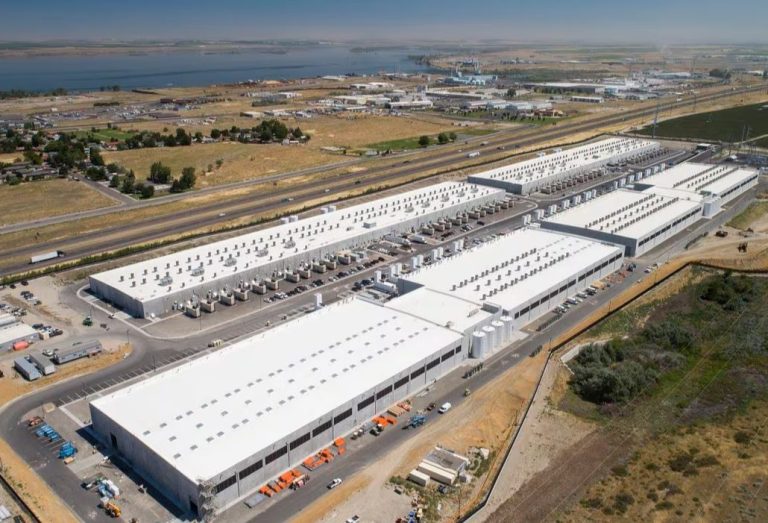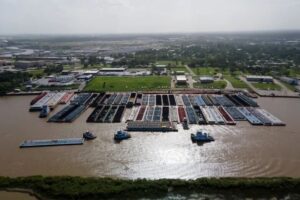When Google decided to build one of its data centers in The Dalles, Oregon, the city council agreed to grant tax breaks to the tech giant. The data center opened in 2006 and would become one of Google’s largest data centers.
In 2011, Amazon opened a data center in The Dalles, providing the infrastructure it needs to provide cloud computing power to customers. Amazon was also offered tax breaks. In subsequent years, Meta, Apple, Twitter, LinkedIn, and Adobe, joined Google and Amazon to build large data centers in Oregon.
Tech companies are choosing The Dalles – the largest city in Oregon along the Columbia River outside the Portland Metropolitan Area – because of its energy infrastructure, water availability, and developable land, all of which are ideal for data centers.
Data centers produce heat and need energy to maintain. Without adequate cooling, the thousands of computer servers inside of them can overheat and catch fire. Tech companies can use either traditional air conditioning or water for evaporative cooling, but because the former is expensive to maintain, tech companies resort to the latter.
A large data center, according to Sensorex, can consume 3-5 million gallons of water every day. A Virginia Tech study also shows that data centers rank among the top 10 water-consuming commercial industries in the United States, using approximately 513 million cubic meters of water in 2018.
Google’s “trade secrets”
When Google wanted to expand its data center in Oregon in 2021, the company refused to disclose the amount of water it consumed and how much more it would consume with its expansion.
The Oregonian/OregonLive has been covering issues regarding the tech companies and the data centers but got some tips that prompted it to dig further. The newspaper said such information should not be kept secret but be made available to the public.
“There were some concerns about Google’s water use in The Dalles and details of tax breaks granted to Amazon with concerns that local public officials arranged tax breaks and land sales with Amazon that benefited them personally,” said reporter Mike Rogoway.
Using Oregon public records law, Rogoway requested access to records on Google’s water usage, but the city defended the company, claiming the information was a “trade secret.”
Rather than give the documents to the newspaper, The Dalles sued the Oregonian/OregonLive to prevent it from getting access to the documents.
The Reporters Committee for Freedom of the Press stepped in and represented The Oregonian/OregonLive in court for free. At this time, Google was funding The Dalles lawsuit against the newspaper.
This was a big challenge for the investigation because Google had massive resources to fund the lawsuit. After the case dragged on for a year, Google and The Dalles surrendered after the district attorney ruled against them stating that the water use was not a trade secret, and ordered the information released.
“We were able to get that information and saw just how much water they were using, which was a quarter of all the water in the entire city and triple what they’d been using just a few years earlier. And they have two more data centers planned,” said Rogoway.
The Oregonian/OregonLive did not just win the case, the court also compelled Google to compensate the Reporters Committee for Freedom of the Press for their legal work.
Tax breaks for large companies shortchange citizens
For Amazon, Rogoway got some tips regarding inconsistencies in the tax breaks granted to Amazon. He obtained documents that were difficult to analyze but got help from finance professionals and experts in nonprofit governance to help readers understand why the Amazon tax incentives deal was unusual.
The investigation unraveled how The Dalles public officials illegally awarded tax breaks and arranged land sales to Amazon. Rogoway said the tax break incentives were created decades ago for factories and to encourage employment but the tech giants have now taken advantage of the law to shortchange the people of Oregon.
The Oregonian/OregonLive found that Google saved over $240 million and Amazon saved over $10 million in taxes. Rogoway feels Amazon could have done more in championing development in the Oregon counties.
The publications of this investigation started to make immediate impacts. Three officials are currently under investigation by the State Ethics Commission and the Oregon Department of Justice is investigating how the business these officials owned was transferred from the nonprofit on whose board they sat. One port commissioner has resigned and another lost reelection.
“There’s also a push in the state legislature to make data centers comply with state’s clean energy rules,” said Rogoway. “They tried to get it passed in this last legislative session. Amazon lobbied heavily against it, spent a lot of money, and succeeded in defeating it.”











